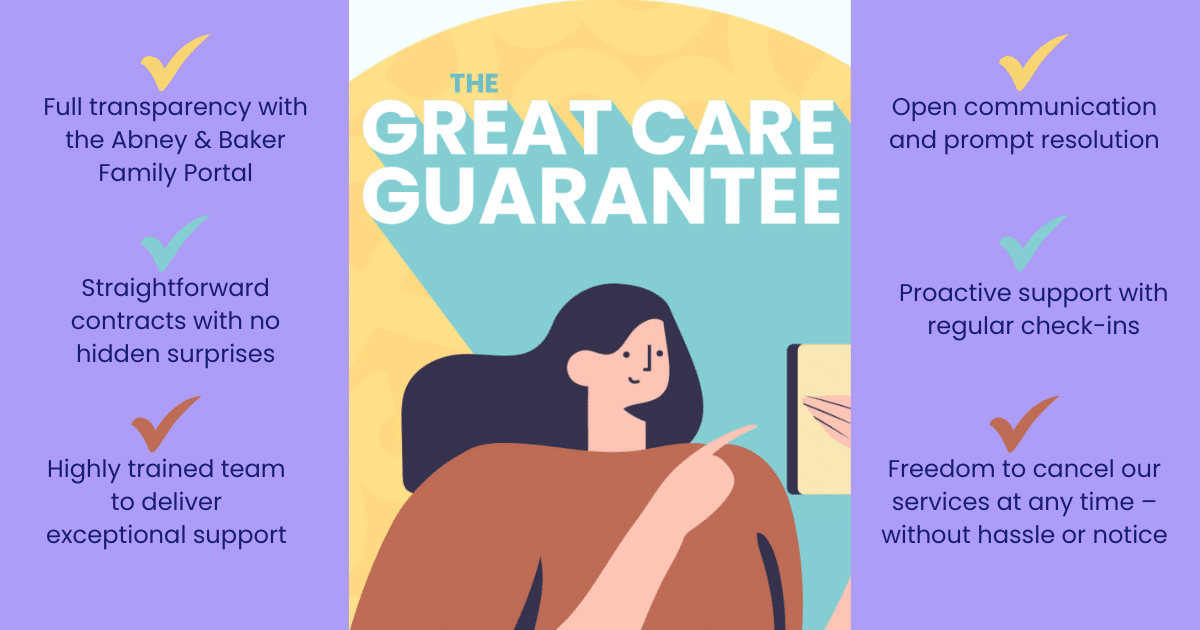Caring for an elderly loved one or friend can be a stressful challenge that often takes it’s toll on your health.
But only part of that stress comes from juggling day-to-day care and support, a large contributor is the strong emotions that naturally come with ongoing caregiving.
To help reduce stress, it’s important to recognise the tough emotions you’re likely to face and what you can do about managing them.
Identifying and acknowledging your emotions is the first step to dealing with them
Have you had any of the thoughts below?
If so, you’re definitely not the only one. These are very common emotions amongst those who care for loved ones.
Guilt
- I’m worried if I ask for help I’ll be seen as a failure
- I’m not doing a good job of looking after my children whilst caring for dad as well
- I’m neglecting my relationship with my partner whilst care giving
- I’m struggling to juggle all the different roles I’m expected to do
- My job/career is suffering because I’m having to spend time care giving
- It’s my responsibility to care for my parent as they did for me growing up
- I’m not doing enough
- I promised I would always care for mum at home
- I should be doing a better job
- I shouldn’t be feeling angry or resentful
Sadness and depression
- I feel like I’m a shell of my former self
- I just can’t cope
- I can’t stand for things to be this way
- It’s hopeless, there’s nothing I can change
- I can’t see a light at the end of the tunnel, things are only going to get more challenging

Loneliness
- I feel abandoned. Friends and family have dropped away
- I don’t have a life outside of caregiving, it takes all my energy and time
- I don’t have anyone I can turn to who would understand how I’m feeling
- I feel isolated
- I have to keep turning down offers to socialise as I’m too worried about who would look after dad
Tips for managing your challenging emotions
There’s no denying it, caregiving can be challenging and can feel like a thankless job sometimes particularly if you don’t have a strong support network around you.
But, there are some ways to help manage these understandable and very common emotions:
Find support from people who understand
Finding people who really ‘get it’ is important. Whether that’s joining a local caregivers support group, an online community or talking to friends or other family members are also caring for an elderly loved one.

You’ll soon realise the emotions you’re feeling are very common. Although talking to someone in a similar situation won’t take away the emotions, it will go a huge way to reassuring you that you’re not alone and that the full weight of responsibility isn’t solely on your shoulders, there is help and support out there.
Talking with others is also a chance to give and receive tips for solving the problems that keep you awake at night. And sometimes, talking through a problem can lead you to a brilliant solution or help you accept a difficult decision.
Find humour wherever you can
Finding the humour wherever you can, even in particularly challenging times, can be an amazing coping technique.
After you’ve had a good cry if needed, move on to finding the laughter whenever possible.
Don’t feel guilty about looking for humorous moments, you’re not laughing at your elderly loved one, just the situation you’re in.
Often, your laughter could inspire your loved one to laugh too which eases the tension and lightens the mood.
Another reason to talk with others who are also caring for elderly loved ones is so you can laugh together about things only caregivers would understand.

Don’t be afraid of asking for help
There is absolutely no shame, in fact it’s highly recommended, that you don’t take on caregiving purely by yourself. It’s a huge weight for a single person to take on your shoulders.
Respite services in the home are available to give you peace of mind that your loved one is being professionally cared whilst you focus on other areas of your life or just take a well earned break.
It doesn’t need to be a full holiday abroad, even taking a break once a week to go for a coffee with a friend or pop to the market for a mooch can make the world of difference to how you feel and in turn are then able to cope when you continue caregiving on your return.
Care companies can work hand in hand with you rather than completely take over so you still feel you’re highly involved in the care and support but you’ve got quality back up. That way your loved one receives the best care and the best of you.
If you do want to talk to us about the challenges you’re currently facing and how we may be able to support you and your loved one, then do give us a call or click below to book a call and we’ll give you a shout back.
Helping your loved one to continue living independently and confidently in their own home.
By providing a range of support at home, we’re helping many clients across Bath & North East Somerset and West Wiltshire retain their independence and stay in control in the comfort of their own homes.
Remember we’re always here if you want to chat about your care options. Just get in touch:
Call 0333 043 4880 – Email enquiries@abneyandbaker.com – Book a call here














